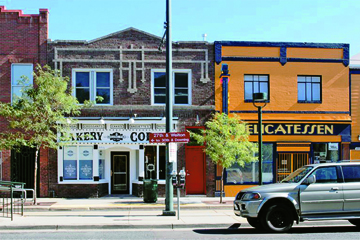


St. Anne’s Episcopal School

BID Fight In Five Points
November 8 Vote Pits The Politically Connected Against Local Property Owners
by Megan Carthel
Five Points has been a neighborhood plagued with improvement promises and nothing to show for them. In 1994, the D Line was built through the middle of Welton Street by RTD, bringing less than satisfactory results.
A cultural center for decades where Jazz and Black culture used to thrive along Welton Street, there now stand empty buildings, ghosts of once was. Now, the city and residents are hoping to revive the once robust area — the question is whether a business improvement district (BID) or the free market should kick-start this inevitable change.
On May 31, 2016, the Denver City Council approved the formation of the Five Points BID, but come November 8, 2016, the commercial property owners will have the final say with a vote.
Currently the Five Points neighborhood has the Five Points Business District (FPBD) that has focused on business development and cultural promotion and preservation. Tracy Winchester, Executive Director of the FPBD, has helped to aid the start of a BID along the Welton Street corridor. The BID will supplement City services like security, maintenance and beautification for the 10 blocks of Welton Street from 20th to 30th streets.
“I think it’s important that we have a business improvement district in the Five Points area along the Welton street corridor, which has always been a historically commercial corridor,” Winchester said. “And I think it’s important that we mobilize ourselves as businesses that do have a vested interest in seeing the survivability of this corridor and not only for the businesses that are here, but also for the residents that are here.”
Myron Melnick, a commercial property owner in the district since 1996, opposes the BID. He even wrote a piece in Brother Jeff, a local media outlet. Days after his piece was published, his building was tagged with spray paint.
“I think these people [who are for the BID] are reacting to what’s best for them,” Melnick said. “I’m neutral as far as that goes. What’s best for the neighborhood is what’s best for me, but I don’t want to see McDonald’s there, I don’t want to see Kentucky Fried Chicken there.”
When asked about the tagging, Councilman Albus Brooks said the following:
“I can’t think of a better way to support this effort,” Brooks said. “There’s no security there today. This allows security to be in place. This allows security to see something going on and securing the area and calling the police. That’s a problem with Welton; there’s just not enough eyes right now in all of these locations.”
The Five Points BID will focus on maintenance, security and beautifying the area.
“We’re pretty much following the path of other neighborhoods, business corridors that want to see improvement in their neighborhood as it relates to the business area,” Winchester said.
“I don’t want to pay more taxes, more property tax,” Melnick said. “What do I need the city or this organization to shovel my walk and pick up litter? I don’t need that.”
The BID has an estimated budget for 2017 of $161,988, with $156,996 coming from a 10 mill levy on commercial property owners. The other $4,992 comes from a Local Maintenance District currently in place that will be removed if the BID is approved. The FPBD will assist with administrative needs for two years and then will no longer be active. The BID board will then have to decide how those administrative needs will be met.
Dr. Renee Cousins King, Paul Books, John Pirkopf, Nathan Beal and Carl Bourgeois were appointed to the BID board. Together, the board makes up over 15 percent of the total acreage and over 16 percent of the total value of the Welton Street BID boundaries. In order for a BID to pass, 50 percent of both the acreage and assessment values must be in favor. In total, the BID received just over 56 percent of the acreage and 62 percent of the assessment value in favor.
Some commercial property owners see a different vision than what they feel the BID board sees. Blair Dunn, commercial property owner on Welton Street, feels with a BID in place, larger commercial chain businesses will come into the area, pushing out the smaller businesses, and with it, the historical cultural importance.
“I think losing that identity would be the worst thing in the world,” Dunn said. “It kind of identifies the area, and what I hear from the BID is zilch as far as keeping that, keeping Black businesses, keeping kitchy stuff. It’s almost like the message is that ship has sailed and we’re going for intense hipster growth.”
Dunn also owns property on Colfax, where there is a BID in place. Before the BID was instated on Colfax, he paid $1,500 in taxes, now he is paying over $4,000. Dunn and Melnick both said they would prefer an organic growth of the Five Points neighborhood. Chuck Sagere, a close by resident who visits the Welton Street corridor often, thinks a BID would help to revitalize the area and is worth the cost.
“I think it’s beneficial. It does need to be revitalized. I particularly would like to see the nostalgia of the era when this place was thriving and keeping things clean and neat only brings it back to life,” Sagere said. “Nostalgia costs. I think it’s a benefit of a hundred times the amount (commercial property owners) pay out.”
“Retail wants to locate in places that are free of crime,” Brooks said. “This BID will hire security; this BID will have clean streets. This BID will bond against itself to do a two-way street. So, it’s about changing the environment and infrastructure, and that’s where retail wants to go.”
There are multiple developments going into the Five Points neighborhood. Star Mesa Properties is currently conducting a $1 million renovation in hopes to house retail, office or restaurant space at 2801 Welton St. Pirkopf and his partner bought 2737 Welton St. where a barber shop and salon once stood. The 109-year-old single-story building will be replaced with a two-story structure.
On November 8, 2016, a TABOR election will be held for commercial property owners, either solidifying or rejecting the BID.

The Fight Against Zika Needs Sufficient Federal Support
by Congresswoman Diana DeGette
Congress has returned to Washington, having failed throughout the spring and summer to take meaningful action on some of the nation’s most pressing problems. Thanks to Republican legislators’ intransigence, we are now confronted by an issue that grew substantially worse while we were away: the spread of the Zika virus on American soil.
Fortunately, Colorado faces little threat of an outbreak, as researchers at Colorado State University recently proved. The mosquito that spreads the disease doesn’t thrive in our climate. There could be isolated cases involving travel to Zika-affected areas or intimate contact with people who have traveled there, but no mass spread is expected.
However, in meetings and at events throughout August, constituents raised justifiable concerns with me about Zika. They’re rightly concerned that the country is grappling with an ailment that only recently emerged on the world’s consciousness and is directly affecting Americans now.
Throughout the year, I’ve vocally supported President Obama’s request for nearly $2 billion for Zika research, prevention and treatment. Democrats throughout Congress have done the same. But the majority refused to fully fund that effort. In fact, in late summer as Congress prepared to reconvene, the Centers for Disease Control and Prevention (CDC) said current Zika funding would run out when the fiscal year ended on September 30.
Nevertheless, there was delay in DC at this critical point in our fight against this persistent and pernicious disease, and the funding effort fell short.
Clinical trials on a possible vaccine, which have just gotten under way on a limited scale through the National Institutes for Health, can’t be carried out with no funding. In fact, NIH says it’s irresponsible to start any larger trials unless we can see them through.
There are infants in Zika-affected areas who show no signs of the virus now, but may do so as they develop. Longitudinal studies tracking their progress will be impossible without sufficient support.
And even though infection rates will drop with the arrival of cooler temperatures, they won’t go to zero. The Aedes Aegypti mosquito that carries the illness has been shown to effectively survive the winter and come back in the next year.
Earlier this summer, President Obama addressed the nation about the Zika threat once it began to spread in parts of the continental United States. He reassured us that public health experts don’t expect to see the kind of widespread outbreaks that had occurred in Brazil, Puerto Rico and elsewhere. However, he noted that “we cannot be complacent because we do expect to see more Zika cases.”
Congress must provide sufficient Zika funding immediately to state and local authorities along with federal agencies such as the CDC so they can do what’s necessary to combat Zika. And the funds shouldn’t come from other important health efforts, such as developing a vaccine for Ebola, nor be weighed down by provisions that are likely to cause needless controversy.
With the right support, we can speed the development of a vaccine, allow more people to get tested and get a prompt result, and ensure that states and communities have the resources they need to fight the mosquito that carries the virus.
Congress shouldn’t drag its feet, borrow funds from elsewhere, or do anything less than fully support this effort. We must ensure that we have the resources we need to take every step necessary to protect the American people from the Zika virus.
Diana DeGette represents the people of Colorado’s First District in the United States Congress.


